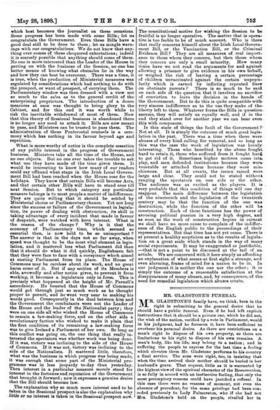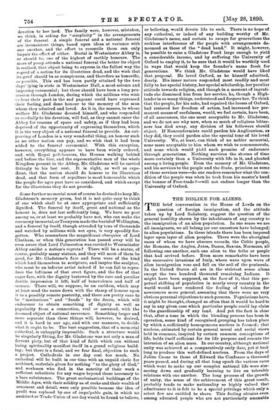MR. GLADSTONE'S FUNERAL.
MR. GLADSTONE'S family have, we think, been in the right in submitting to the general desire that he should have a public funeral. Even if he had left explicit instructions that it should be a private one, which he did not, the wish of the nation, verified by a vote in Parliament, would in his judgment, had be foreseen it, have been sufficient to overbear his personal desire. As there are restrictions on a man's right to dispose of his own property, so there are limitations to his right to dispose of his own remains. A man's body, like his life, may belong to a nation; and in suffering the people to express for the last time a feeling which elevates them Mr. Gladstone performs to his country a final service. The sons were right, too, in insisting that when the time arrived their mother should be buried in her husband's grave. That request, little as it is warranted by the highest view of the spiritual character of the Resurrection, is so fully in accord with an instinctive feeling, that only the most peremptory reasons could have justified a refusal. In this case there were no reasons of moment, not even the absence of precedent, for the same privilege had been con- ceded previonsly to Lady Palmerston, who if she had not Mrs. Gladstone's hold on the people, rivalled her in
devotion to her lord. The family were, however, mistaken, we think, in asking for " simplicity " in the arrangements of the funeral. A simple funeral and a national funeral are inconsistent things, based upon ideas at variance with one another, and the effort to reconcile them can only impair the effect of either. Burial in Westminster Abbey is, or should be, one of the highest of earthly honours. The more of pomp attends a national funeral the better its object is realised, that object being to express in the fullest way the regard of a nation for its illustrious dead, and the wish that its grief should be as conspicuous, and therefore as honorific, as possible. This end has been partly attained by the two days' lying in state in Westminster Hall, a most solemn and imposing ceremonial; but there should have been a long pro- cession through London, during which the millions who wish ,to bear their part in the sad pageant could have expressed their feeling, and done honour to the memory of the man whom they admired and loved. As it is, the masses, to whose welfare Mr. Gladstone devoted himself, and who responded so cordially to his devotion, will feel, as they cannot enter the Abbey for reasons of space and safety, as if they had been deprived of the opportunity of expressing themselves, which it is the very object of a national funeral to provide. An out- pouring of London is a very wonderful thing, an honour such as no other nation can pay, and we wish that it had been added to the funeral ceremonial. With this exception, however, everything appears to have been wisely ordered, and with Royal pall-bearers, the Houses walking behind and before the bier, and the representative men of the whole Kingdom present in the Abbey, Mr. Gladstone will be carried fittingly to his last rest. It is right, as well as expe- dient, that the nation should do honour to its illustrious dead, and that form of sepulture is most honourable which the people for ages past have so considered, and which except for the illustrious they do not provide.
Some further memorial must of course be devised to keep Mr. Gladstone's memory green, but it is not quite easy to think of one which shall be at once appropriate and sufficiently dignified. The funeral by itself, great and national as the • honour is, does not last sufficiently long. We have no poet among us, or at least we probably have not, who can make the ceremony immortal, as Tennyson made the burial of Wellington, and a funeral by itself, though attended by tens of thousands and watched by millions with wet eyes, is very speedily for- gotten. Who remembers the magnificent obsequies of Lord Chatham, or when this generation has passed away will be even aware that Lord Palmerston was carried to Westminster Abbey amidst a nation's regrets ? There will be a statue, of course, probably many statues, and they will most of them be good, for Mr. Gladstone's face and form were of the kind which lend themselves to sculpture, and inspire the sculptor, who must be an inferior artist indeed if he can fail to repro- duce the loftiness of that erect figure, and the fire of that eager face, with the dignity bestowed by the rare and peculiar double impression it left, half of benevolence and half of menace. There will, we suppose, be an earldom, which may at least send the name down with the stamp of honour upon it to a possibly remote posterity, and there are pretty sure to be " institutions " and " funds " by the dozen, which will endeavour to obtain something of dignity as well as popularity from a connection, real or assumed, with the deceased object of national reverence. Something larger and more separate than these things will, however, be desired, and it is hard in our age, and with our manners, to decide what it ought to be. The best suggestion, that of a memorial cathedral, is unhappily impossible. Such a structure would be singularly fitting, for Mr. Gladstone was not only a man of fervent piety, but of that kind of faith which can without losing spirituality manifest itself in a grand religious build- ing; but there is a fatal, and we fear final, objection to such a project. Cathedrals in our day coat too much. No cathedral will be built in our time with an unpaid cleric for architect, materials given for nothing "to the glory of God," and workmen who find in the sanctity of their work a sufficient substitute for any wages beyond those necessary to a bare subsistence. The great ecclesiastical buildings of the Middle Ages, with their solidity as of rocks and their wealth of ornament and detail, were only possible because the idea of profit was replaced by one of impalpable gain, in which no architect or Trade-Union of our day would be found to believe, or believing, would devote life to seek. There is no hope of any cathedral, or indeed of any building worthy of Mr. Gladstone's name, and certain to escape for generations the reckless interference of the people with arrangements de- nounced as those of the "dead hand." It might, however, be possible to raise a Gladstone Fund large enough to yield a considerable income, and by suffering the University of Oxford to employ it, to be sure that it would be worthily used in ways that would keep the founder's name fresh for generations. We think Mr. Gladstone would have liked that proposal. He loved Oxford, as he himself admitted, dearly. His inner nature responded most readily and most fully to her special history, her special scholarship, her peculiar attitude towards religion, and though in a moment of ingrati- tude she dismissed him from her service, he, though a High- lander in so many things, understood and forgave her. To think that the people, for his sake, had repaired the losses of Oxford, had restored her freedom of action, had increased her per- manent means of usefulness, would, we feel certain, have been, of all assurances, the one most acceptable to Mr. Gladstone, and we do not see why now, when so much of religions bitter- ness has died away, any division of his followers should object. If Nonconformists could pardon his Anglicanism, ax they did, they could pardon also the special tone of his loved University. We, at least, can think of no nobler memorial, none more acceptable to him whom we wish to commemorate, and none which would yield such promise of endurance through generations. Nothing survives the storms of time more certainly than a University with life in it, and planted among a living people. Even the memory of Mr. Gladstone, and his services to the people and the State, priceless as some of those services were—do our readers remember what the con- dition of the people was when he took from his master's hand the banner of Free-trade ?—will not endure longer than the University of Oxford.



































 Previous page
Previous page